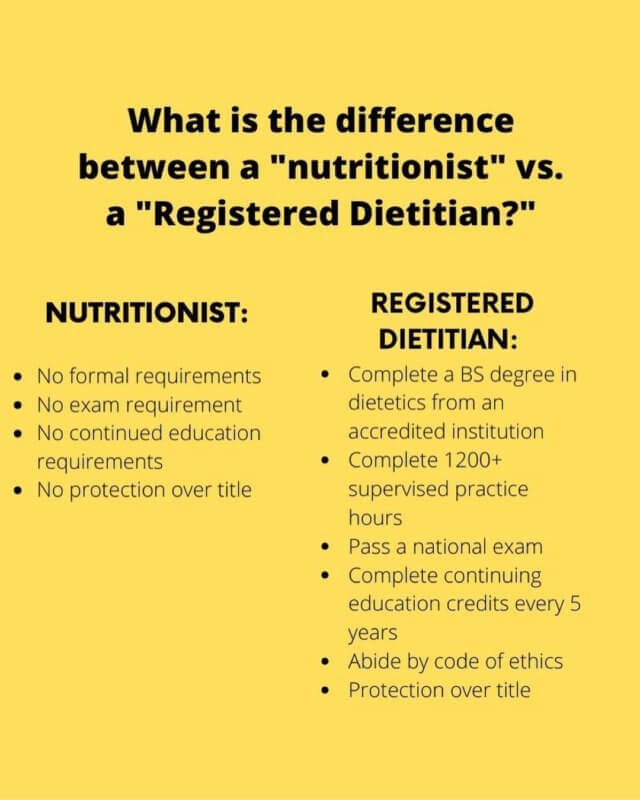All Categories
Featured
Table of Contents
The sorts of Nutritional experts are: and. The previous are those people who make use of the clinical approach to research nutrients, both as private substances and as they interact in food and nourishment while the last are professionals who aid in detecting the nutritional issues of communities and in finding solutions to those issues.
: They collaborate with health cares and international health organizations.: They are accountable for large-scale food preparation and service.: They are professionals in nutrition and aging. They are Board licensed in Gerontological Nourishment with the American Dietetic Association.: They are primarily included with nutritional associated study in the clinical element of nutrition in condition states, public facet on main, second and often tertiary health and wellness avoidance and foodservice element in concerns including the food gotten ready for clients.
Who Is The Best Qualified Nutritionist Service?
: These act as source individuals for the media. Dietitians' proficiency in nourishment is usually taped for TV, radio, and papers-- either as a specialist visitor point of view, regular columnist or guest, or for source, restaurant, or dish growth and critique.: These job under private practice. As explained above, all dietitians are nutritionists however not all nutritionists have the credentials and credentials to be called dietitians.
This suggests specifically the very same thing as Registered Dietitian (RD), a term that has actually been in use for a long time. While certification to come to be an RD or RDN is governed by the Academy of Nourishment and Dietetics a nationwide company licensure is controlled by specific states.

In order to supply medical nourishment treatment and certify as suppliers for insurance coverage companies, a dietitian must be accredited by the state. According to the Bureau of Labor Statistics, the demand for dietitians and nutritionists is anticipated to raise by 20% between 2010 and 2020 this is a much faster growth price than the average for all professions.
What Is The Average Cost Of Celiac Nutritionist Services?
There are considerable differences in payment based upon specialization, with Professional Pediatric Dietitians and Dairy Nutritionists averaging approximately $90,000. In 2014, The Bureau of Labor Statistics (BLS) discovered that the leading 10% of dietitians and nutritional experts earn greater than $79,000, and the lower 10% much less than $36,000 - Dietary Advice. A mean hourly wage of $27.62 was determined for both fields, with the top 10% earning above $38.00 per hour, and the bottom 10% earning below $17.00 per hour

However, there is a range of jobs offered in various settings for those who desire to collaborate with the general public, along with for those that prefer more research-focused work. Many enter one of these fields in order to help people live healthier lives which can be tremendously gratifying.
With existing statistics that one-third of the U.S. population is obese, along with a large number of elderly U.S. locals, dietitians and nutritionists are most likely to have a more comprehensive function in the future. My Plan rates dietitians and nutritionists at # 53 in their happiness index of leading 300 careers with the highest job contentment scores.
In enhancement to attending a certified program, a lot of states need dietitians to be licensed or to have specialist accreditation, or both.
Is It Worth Paying For Licensed Nutritionist?
Nonetheless, it's crucial to keep in mind that starting Jan. 1, 2024, you'll additionally need to hold a master's level to gain an RD/RDN credential. Common bachelor's levels for dietitians include medical nutrition, dietetics, and public health. Your core courses might include: Food scientific research Chemistry Health and wellness treatment plan Medical nutrition Biostatistics Microbiology Food service management You'll likewise need to complete a dietetic teaching fellowship.

Whether created in legislation or not, dietitians and nutritionists lots of times need a comparable education and learning. Usual bachelor's degrees for nutritionists consist of nourishment science or a related technique, such as dietetics, kinesiology, food system monitoring, or biochemistry.
The number of hours you'll require may depend on needs in the state where you'll work. Whether you intend to gain a credential or not, it's a good idea to complete at the very least one teaching fellowship to gain valuable experience prior to looking for a full-time duty. Licensing and accreditation demands for nutritionists and dietitians differ from one state to another.
How Do I Find A Professional Nutritionist Service?
An expert accreditation shows your expertise and knowledge in your area. Here are the top accreditations for dietitians and nutritionists.
The titles are essentially the exact same. There's no specialist difference in between them, and you're free to select which one you intend to utilize based on individual preference. To take the qualification exam, you need to: Earn a bachelor's degree that's certified by the ACEND Complete a dietetics teaching fellowship After Jan. 1, 2024, you'll need to gain a master's level to get approved for the certification.
What Is The Best Sports Dietitian Product?
Bureau of Labor Data puts dietitians and nutritional experts in the very same group and says they gain a typical annual wage of $69,680. There is an array in incomes, with the bottom 10% around $44,910 and the top 10% around $98,830, according to the BLS. Nutritionist and dietitian functions are anticipated to grow 6.6% through 2032, according to the BLS.
This doesn't mean that a person career is remarkable to the other, as they both have various features and qualifications that might in some cases overlap. If you intend to find out more regarding what makes these careers distinct, keep analysis. Diet professionals are specialists who aid boost the high quality of life through healthy food options.
What Is The Best Sports Dietitian?
Nutritional expert guidance regarding nutrition's influence on wellness. The area is much less controlled than dieticians; therefore, nutritionists' levels of experience and credentials can vary.
There are a number of distinctions in between dieticians and nutritionists. Below are the training and background requirements. Dieticians usually hold a bachelor's level in dietetics, nourishment, or an associated field. As their careers development, numerous dieticians pursue sophisticated degrees, like a Master's or Doctorate, to specialise in certain locations of nutrition. Diet professionals need to carry out supervised practical training as component of their education and learning to acquire hands-on experience in clinical settings, community nutrition programs, or food service monitoring.
Latest Posts
How Do I Find A Christian Bale Body Service?
What Is The Best Accredited Sports Dietitian App?
What Are The Best 8 Week Body Transformation Female Companies?